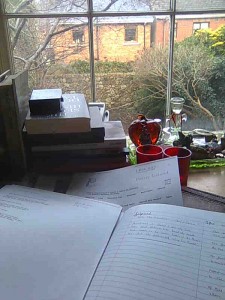On Transcriptions: Transcribing Women’s Poetry
I transcribe women’s poetry.
This short post is related to what I do on the Poethead blog and I suppose to the area of women’s writing that has been a concern for a few years now.
Many of the poems that are a part of Poethead have found their way into my possession as gifts, or from the libraries and collections of people who bought (or ordered) the books when they were originally published. Quite a few of the books that I have been privileged to read are not obtainable from our local friendly bookshops, though they can often be had through Amazon or other such internet outlets.
The poems on the site were in the main transcribed from books by me, though not all of them are.
I started transcribing poetry as an exercise a few years ago because of something I had read in A.S. Byatt’s Possession. Roland Mitchell’s thoughts on the teaching methodologies of his superior regarding transcriptions stuck with me. I wanted to test how I would do if I were to know a poem through the copying of it. I soon learned that no matter how carefully one attempts a transcription, it is incredibly easy to mess up the simplest things and change the sense of the work completely.
As a discipline, transcription is an interesting way of learning about the exterior form of the poem, and although it is but a poor cousin to translation , or indeed , actually creating a poem, it is a beneficial exercise that I would recommend to working poets especially during fallow or blocked periods.
The little library in Mayo, Ireland, where I started transcribing a limited collection of women poets is soon to be broken up and transported into the care of a family-member, as its owner has been in frail health for sometime.
I know that my access to the poets will be necessarily altered because of this, and whilst it is a sad experience to witness inevitable changes . It was quite amazing to find original pamphlets and hard-back works, which I could carry to the study desk and work on. The house had no internet or television, just some pretty wonderful books and music. The weather in Ireland’s North-West in winter is hardly conducive to walking out, so one literally went back in time to the works of women in war and learnt about their voices. I expect that the most memorable pieces that I worked on and got consistently wrong were those of Edith Sitwell, whose Serenade is irrevocably in my head at time of writing this :
Serenade.
I’ll woo you with a serenade –
The wolfish howls the starving made,
And lies shall be your canopy
To shield you from the freezing sky.
.
Yet when I clasp you in my arms –
who are my sleep, the zero hour
that clothes instead of flesh my heart,
you in my heaven have no part,
for you my mirage broken in flower,
I transcribed the above post the Aceh tSunami, in Mayo, whilst awaiting news of my brother who we had thought was at Phuket. I also remember that the music playing whilst I worked was by Hildegard of Bingen.
I have had calls from another poet or two who have thanked me for bringing their work back online, because women’s poetry has the virtue of quite simply vanishing when it is not visible.
The fact that the poetry of male writers is hardly out of the public eye (at least in Ireland) is hardly a wonderful message to young women poets who may actually see little in the way of role-models and think that poetry is a dying art for them! Not true , I believe that we have erred in prioritisation by not keeping women writers visible in editorial choices, in publishers lists for awards, and in the chosen weekly poems in our national newspapers, with the honourable exception of the Guardian newspapers in these islands.
Interestingly, some emails about the writers I add in to the blog suggest that people are seeking more and not less of women’s writing and this is an excellent thing. The Nelly Sachs , Mirjam Tuominen and Ágnes Nemes Nagy poems are similarily transcribed from original editions, and from a collection bequest from the late Marianne Agren Mc Elroy who worked as a translator, whilst also being an artist and mother. I sometimes cannot even get my own poems right, and have had to correct them days later when I have the time to go back to the notebooks.
As a final treat , I thought to add here the piece that provoked this post which recently featured in the excellent Jacket 2 blog and collaborative space, The Book of Revelations by Hannah Weiner. I hope that it provokes further thought on the work that women writers, editors, translators and transcribers undertake in the narrative and visual arts.
—–
Follow Irish poet and women’s poetry advocate @celizmurray on Twitter. Visit Poethead, Christine’s blog that publishes women’s poetry.
Category: Irish Women Writers, Poetry by Women Poets, Women Writing Poetry




























Comments (3)
Trackback URL | Comments RSS Feed
Sites That Link to this Post